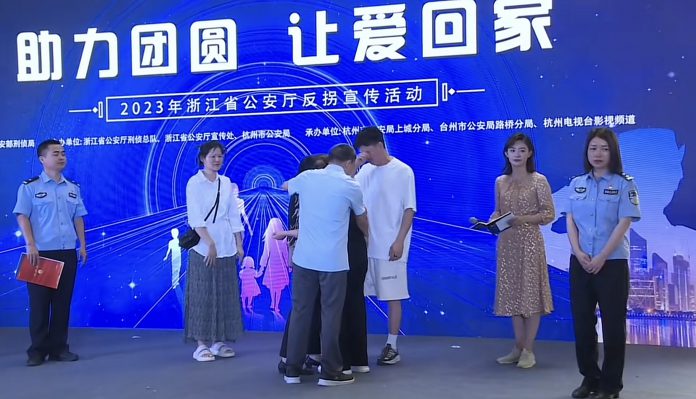CCTV programme helps families look for loved ones whom have been lost for years.
By Cathleena Zhu
Liu Linlin now lives with her parents in Inner Mongolia and spends festivals with them every year after being apart for 19 years.
Liu was given to a worker 30 days after she was born by her birth parents at a construction site in Hunan Province in 2000 because of financial difficulties.
She was then adopted by Xiang Minghua, a housewife. The baby girl was just 50 days old.
“My adopted mother raised me like my birth mother,” says the 24-year-old university student.
Liu was diagnosed with parotid gland cancer when she was seven. After comparing the DNA in her treatment tests, she learned that Xiang was not her birth mother.
Parotid gland cancer is a malignant tumor occurring in the parotid gland. The size is generally three to five cm, and its tumor growth rate is fast.
“I felt scared and was in great pain when I had my cheek surgery, but I didn’t want my adopted mom to worry, so I didn’t cry,” Liu recalls.

In 2019, Liu’s disease turned into terminal parotid gland cancer in a checkup and was informed that she had only two to three months to live. That made her want to look for her birth parents.
“I wanted an explanation from them. At the same time, I was curious about what my birth parents were like,” Liu says.
Her adoptive mother, Xiang Minghua, was hesitant about the idea.
“I struggled with whether we should look for her birth parents. I wanted their financial help to cover her medical expenses. But at the same time, I did not want to lose Linlin whom I treat like my biological child,” Xiang says.
“I would also like to say sorry to her biological parents for not being able to look after their daughter. Otherwise, I would live with guilt for the rest of my life,” Liu’s adoptive mother adds.
Liu and Xiang sought help from the China Central Television programme “Waiting for Me,” which helps families find missing loved ones.
Those who seek help from the TV programme have lost children who were abducted. Some of the children were abandoned by their parents, while some fled home because of family pressure.
Liu was helped by Li Qiyue, the head of the missing person team of the TV programme and one of the hosts.
“After receiving Liu’s case in December 2018, we released a short video about her on the TV programme’s website. More than 100 media outlets have since reposted it,” Li says.
“Netizens from Inner Mongolia, Henan, and Hubei provided us with information and clues after seeing the post about Liu,” she adds.
Police and volunteers also joined the search. Liu’s father, who used to work in Qingshan District, Hubei Province, was finally located after a 10-month search that lasted from the end of 2018 to October 2019.
Liu refused to hug her birth parents when they first met.
“We didn’t force the girl to do anything. We respected her decision,” Li says.
“The most important thing is to give Liu care and understanding because children who did not grow up in their biological family are extremely insecure,” the TV host adds.

Liu gradually accepted her birth parents after spending a day with them.
Today, Liu’s condition has been controlled effectively after treatment with the programme’s donation fund. She is more optimistic about her life and her family on both sides.
“We have no excuse for our behavior. We shouldn’t have given up our child,” says Liu’s birth mother, expressing regret for her actions when interviewed by the TV programme for an episode aired in October 2019.
“We owe Xiang who raised my child,” the birth mother adds.
With the help of the national anti-trafficking gene database, police in Qingsha District, and volunteers, “Waiting for Me” has reunited more than 8,000 families on average every year since the programme was first launched in 2014.
Chen Shiqu, deputy director of the Criminal Investigation Bureau of the Ministry of Public Security of China, who is also the investigation and management staff of the missing person team, says most human trafficking cases occur in Henan, Jiangsu, and Shandong.
“With years of separation, the information we get from help seekers might be wrong or incomplete, which makes it harder for us to search. Some families are still not reunited because of this,” Chen says.
Since 2008, China’s genetic database has been set up and is regularly updated to help match children who have been lost for years to find their biological parents.
Chen says the database has helped crack more than 90 percent of the cases.
“We have zero tolerance for human trafficking. Special attention should be paid to the protection of the rights and interests of minors,” he adds.
Edited by Sean Pan
Sub-edited by Ryan Teh







































